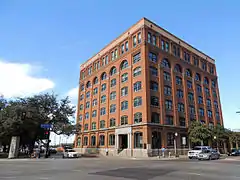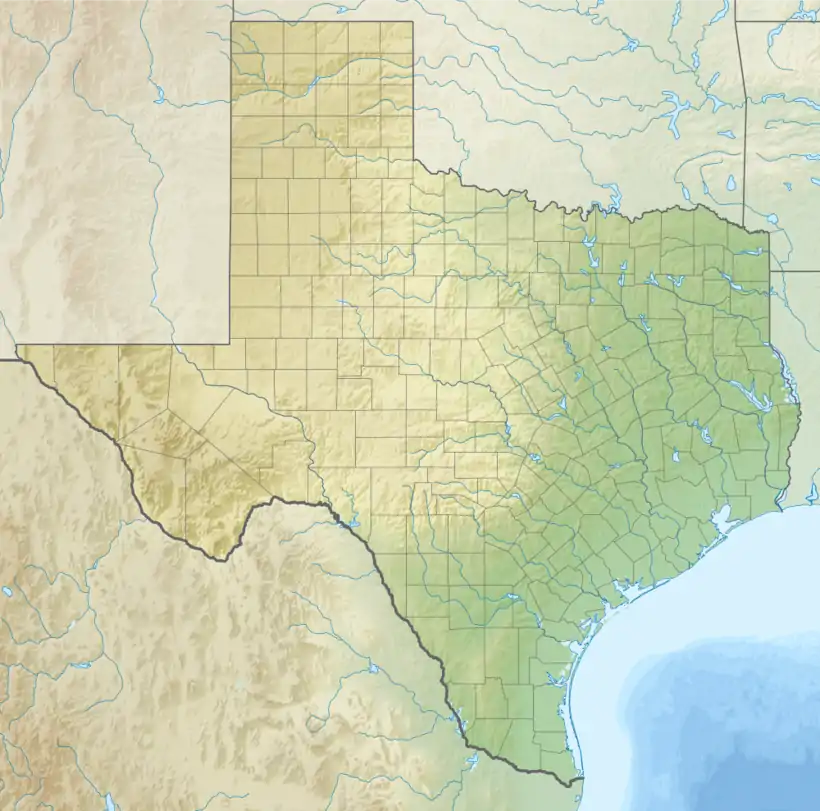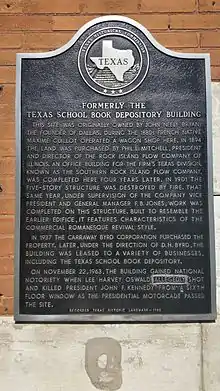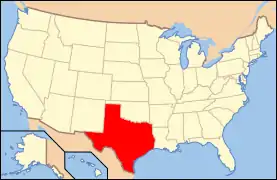Texas School Book Depository
The Texas School Book Depository, now known as the Dallas County Administration Building, is a seven-floor building facing Dealey Plaza in Dallas, Texas. The building was Lee Harvey Oswald's vantage point in his assassination of United States President John F. Kennedy on November 22, 1963. Oswald, an employee at the depository, shot and killed President Kennedy from a sixth floor window on the building's southeastern corner; 30 minutes after the shooting, Kennedy died at Parkland Memorial Hospital. The structure is a Recorded Texas Historic Landmark, located at 411 Elm Street on the northwest corner of Elm and North Houston Streets, at the western end of downtown Dallas.
| Texas School Book Depository | |
|---|---|
 Dallas County Administration Building in 2015, formerly the Texas Depository | |
 Texas School Book Depository  Texas School Book Depository | |
| Former names | Southern Rock Island Plow Company Texas School Book Depository |
| Alternative names | Dallas County Administration Building The Sixth Floor Museum |
| General information | |
| Architectural style | Romanesque Revival |
| Address | 411 Elm St. Dallas, Texas |
| Country | United States |
| Coordinates | 32°46′47″N 96°48′30″W |
| Elevation | 455 feet (139 m) |
| Construction started | 1901 |
| Renovated | 1981 |
| Cost | $3,040,510 |
| Owner | Dallas County |
| Technical details | |
| Structural system | B-Reinforced Concrete Frame Piers |
| Floor count | 8 |
| Floor area | 80,000 feet (24,000 m)[1] |
| Design and construction | |
| Main contractor | Rock Island Plow Company |
| Website | |
| The Sixth Floor Museum at Dealey Plaza | |
Texas School Book Depository | |
Dallas Landmark Historic District
Contributing Property | |
| Part of | |
| RTHL No. | 6895 |
| DLMKHD No. | H/2 (West End HD) |
| Significant dates | |
| Designated NHLDCP | April 19, 1993 |
| Designated CP | November 14, 1978 |
| Designated RTHL | 1981 |
| Designated DLMKHD | October 6, 1975[3] |

Early history
The site of the building was originally owned by John Neely Bryan.[1] During the 1880s, Maxime Guillot operated a wagon shop on the property. In 1894, the Rock Island Plow Company bought the land, and four years later constructed a five-story building for its Texas division, the Southern Rock Island Plow Company.[1] In 1901, the building was hit by lightning and nearly burned to the ground. It was rebuilt in 1902 in the Commercial Romanesque Revival style and expanded to seven stories. In 1937, the Carraway Byrd Corporation purchased the property, but they defaulted on the loan. It was sold at public auction July 4, 1939 and purchased by D. Harold Byrd.[1][4]
Under Byrd's ownership, the building remained empty until 1940, when it was leased by grocery wholesaler John Sexton & Co. Sexton Foods used this location as the branch office for sales, manufacturing, and distribution for the south and southwest United States. In November 1961, Sexton Foods moved to a modern distribution facility located at 650 Regal Row Dallas; by then, the building was known locally as the Sexton Building. The building was refurbished, and partitions, carpeting, air conditioning, and a new passenger elevator were added on the first four floors.[4]
Assassination of John F. Kennedy
In 1963, the building was in use as a multi-floor warehouse storing school textbooks and other related materials and an order-fulfillment center by the privately owned Texas School Book Depository Company. The company found that the upper floors had sustained oil damage from items stored there by the previous tenant, so they began to cover the floors with plywood to protect their books (stored in cardboard boxes) from the oil.[4] Work had begun on the west side of the sixth floor just before President Kennedy's motorcade, "leaving the whole scene in disarray, with stock shifted as far as the east wall, and stacks in between piled unusually high."[4] Lee Harvey Oswald was working as a temporary employee at the building, and fired three shots from a sixth floor window at the presidential motorcade on November 22, 1963.
Second building
The Texas School Book Depository Company maintained a second warehouse at 1917 Houston, several blocks north of the main building. The short four-story structure was well removed from the parade route, half-hidden on an unpaved section of Houston. Oswald's supervisor Roy Truly told the Warren Commission that he had the option to assign Oswald to either building on his first day at work. "Oswald and another fellow reported for work on the same day [October 15] and I needed one of them for the depository building. I picked Oswald."[5] This second building was eventually destroyed to make way for the Woodall Rodgers Freeway.[5]
Later years
During his two terms as mayor of Dallas, Wes Wise guided Dallas out from under the cloud of the assassination and at the same time saved the Texas School Book Depository from imminent destruction, preserving it for further research into the president's murder.[6]
The Texas School Book Depository Company moved out in 1970 and the building was sold at auction to Aubrey Mayhew, a Nashville, Tennessee music producer and collector of Kennedy memorabilia, by the owner D. H. Bard. In 1972, ownership reverted to Bard, and the building was purchased in 1977 by the government of Dallas County. After renovating the lower five floors of the building for use as county government offices, the Dallas County Administration Building was dedicated on March 29, 1981.[7]
On President's Day 1989, the sixth floor opened to the public (for an admission charge) as the Sixth Floor Museum of assassination-related exhibits. On President's Day 2002, the seventh-floor gallery opened.[8][9] The gallery opened on February 18, 2002 with the exhibit: "The Pulitzer Prize Photographs: Capture the Moment".[10] A $2.5 million renovation turned the storage area on the seventh floor into a new gallery space for the museum. Other exhibits that have hung in the space include works of Andy Warhol.[11][12]
On May 4, 2010, burglars attempted to steal a safe from the Sixth Floor Museum, but fled when "they were confronted by a security guard," leaving the unopened safe suspended from a winch on the back of a truck.[13]
See also
References
- Texas State Historical Association (2012). "The Handbook of Texas Online: Texas School Book Depository". Tshaonline.org. Texas State Historical Association. Retrieved April 17, 2012.
- "National Register Information System". National Register of Historic Places. National Park Service. November 2, 2013.
- Staff (August 4, 2016). "West End Historic District" (PDF). Department of Urban Planning, City of Dallas. p. 3. Retrieved August 2, 2018.
- Jerry Organ (2000). "Murder Perch to Museum". Marquette University.
- Bugliosi, Vincent (2007). Reclaiming History: The Assassination of President John F. Kennedy. New York: W.W. Norton. p. 1455. ISBN 978-0-393-04525-3.
- Douglass, James W. JFK and the Unspeakable. Why he died and why it matters. Maryknoll, NY, Orbis Books, 2008, p. 295-298. ISBN 978-1-57075-755-6
- Fagin, Stephen (2013). Assassination and commemoration : JFK, Dallas, and the Sixth Floor Museum at Dealey Plaza. Norman: University of Oklahoma Press. p. 74. ISBN 9780806143583.
- Young, Jan (2006). Seventy-Seven Museum Gems. Lulu.com. p. 57. ISBN 136544399X. OCLC 980689344.
- "History of 411 Elm The Texas School Book Depository and the Sixth Floor Museum at Dealey Plaza" (PDF). JFK.org. August 2013. Retrieved April 30, 2018.
- "Sixth Floor Museum plans exhibit for 7th floor expansion". Dallas Business Journal. February 13, 2002. Retrieved April 30, 2018.
- Kinzer, Stephen (March 3, 2003). "Mixing Tragedy With Art In Dallas; Book Depository Site Now Includes Gallery". The New York Times. Retrieved April 30, 2018.
- Flick, David (November 2010). "47 years after JFK assassination, Sixth Floor Museum adapts to new era". Dallas Morning News. Retrieved April 30, 2018.
- Trahan, Jason (May 5, 2010). "Theft of safe at Sixth Floor Museum visitors center thwarted". The Dallas Morning News.
External links
| Wikimedia Commons has media related to Texas School Book Depository. |
- Dealey Plaza live cam
- Official property ownership record from the Dallas Central Appraisal District
- "Southern Rock Island Building (Texas School Book Depository)". Texas Historic Sites Atlas. Texas Historical Commission. 1901.

